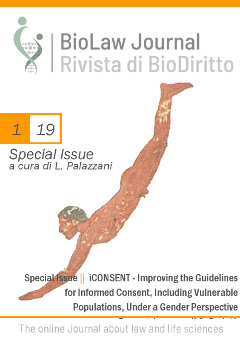Gender and Informed Consent in Clinical Research: Beyond Ethical Challenges
DOI:
https://doi.org/10.15168/2284-4503-401Parole chiave:
Informed consent, vulnerability, gender, fertile women, pregnant/breastfeeding womenAbstract
Informed consent for clinical research is both a communication process and a document to inform individuals about relevance, scope, benefits and risks of their involvement in research and to obtain consent for participation in a study. Critical issues arise when the research involves particularly vulnerable subjects, such as women in some circumstances (i.e. specific physiological conditions, namely, fertility, pregnancy, breastfeeding, or socio-economic vulnerabilities). If, on one hand, participation of particularly vulnerable subjects in clinical research requires special care and safeguards to protect the person's rights and reduce risks of undue inducement and therapeutic misconception; on the other, a vulnerability-based exclusion would result in discrimination and a barrier to possible health benefits deriving from advances in scientific research. In this context, gender-related issues may become a huge challenge in terms of appropriateness, completeness and clarity of information and freedom of consent. This article will explore ethical issues surrounding women's participation in clinical research, with a specific focus on gender considerations in informed consent, through a narrative review of soft law at the European level and beyond on this topic. Concerns on the role of the male/female partner in the informed consent process will also be addressed.##submission.downloads##
Pubblicato
2019-07-10
Come citare
1.
Persampieri L. Gender and Informed Consent in Clinical Research: Beyond Ethical Challenges. BioLaw [Internet]. 10 luglio 2019 [citato 5 febbraio 2026];(1S):65-87. Disponibile su: https://teseo.unitn.it/biolaw/article/view/1362





